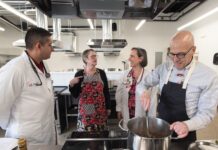
Students in the UofL School of Medicine are prepared to have a direct impact on their own communities and families years before they officially become physicians.
For the first time, 165 first-year med students received a training session to address the state’s opioid epidemic where they learned the principles of harm reduction and to use Narcan, also known as naloxone, to reverse an opioid overdose. The students also each received their own Narcan kit, equipping them to possibly save someone from an overdose.
“We learned how serious the opioid crisis is. It is an epidemic in this country. To tackle the crisis, we need Narcan to be available over the counter and we need more people trained,” said Daniel Hughes, a first-year medical student who took part in the course. “It’s good that the UofL School of Medicine is trying to get as many people as possible trained early on.”
According to the Kentucky Drug Overdose Report, 2,250 Kentuckians died from drug overdoses in 2021, a 14.5% increase over 2020, which saw a 49% increase over 2019. An opioid was involved in 90% of overdose deaths.
The 90-minute mandatory session informed the students how to respond if they encounter someone experiencing an overdose. Instructors James Patrick Murphy, a clinical professor at UofL and board member of the Kentucky Harm Reduction Coalition (KyHRC), and Christopher Stewart, associate professor in the UofL Department of Psychiatry and Behavioral Sciences, also outlined the rationale and evidence for harm reduction according to the Substance Abuse and Mental Health Services Administration.
“Harm reduction is care that meets people who use drugs ‘where they are,’ on their own terms, keeping them alive and as healthy as possible by decreasing overdoses, preventing life-threatening infections and reducing the impact of diseases such as HIV and hepatitis,” Murphy said. “Harm reduction also serves as a proven pathway to additional prevention, treatment and recovery. Simply put, harm reduction is humble and compassionate care that saves lives.”

The students were shown how to use Narcan to reverse an opioid overdose and given a Narcan kit, provided by the KyHRC and valued at $100 each.
Susan Sawning, a professor in UofL’s office of medical education, was instrumental in creating the course and obtaining the Narcan kits for the students. For her, the need is personal.
“I have lost multiple people in my life to overdose,” Sawning said. “I wish their families, friends and medical professionals had had the knowledge about harm reduction our students learned through this training.”































